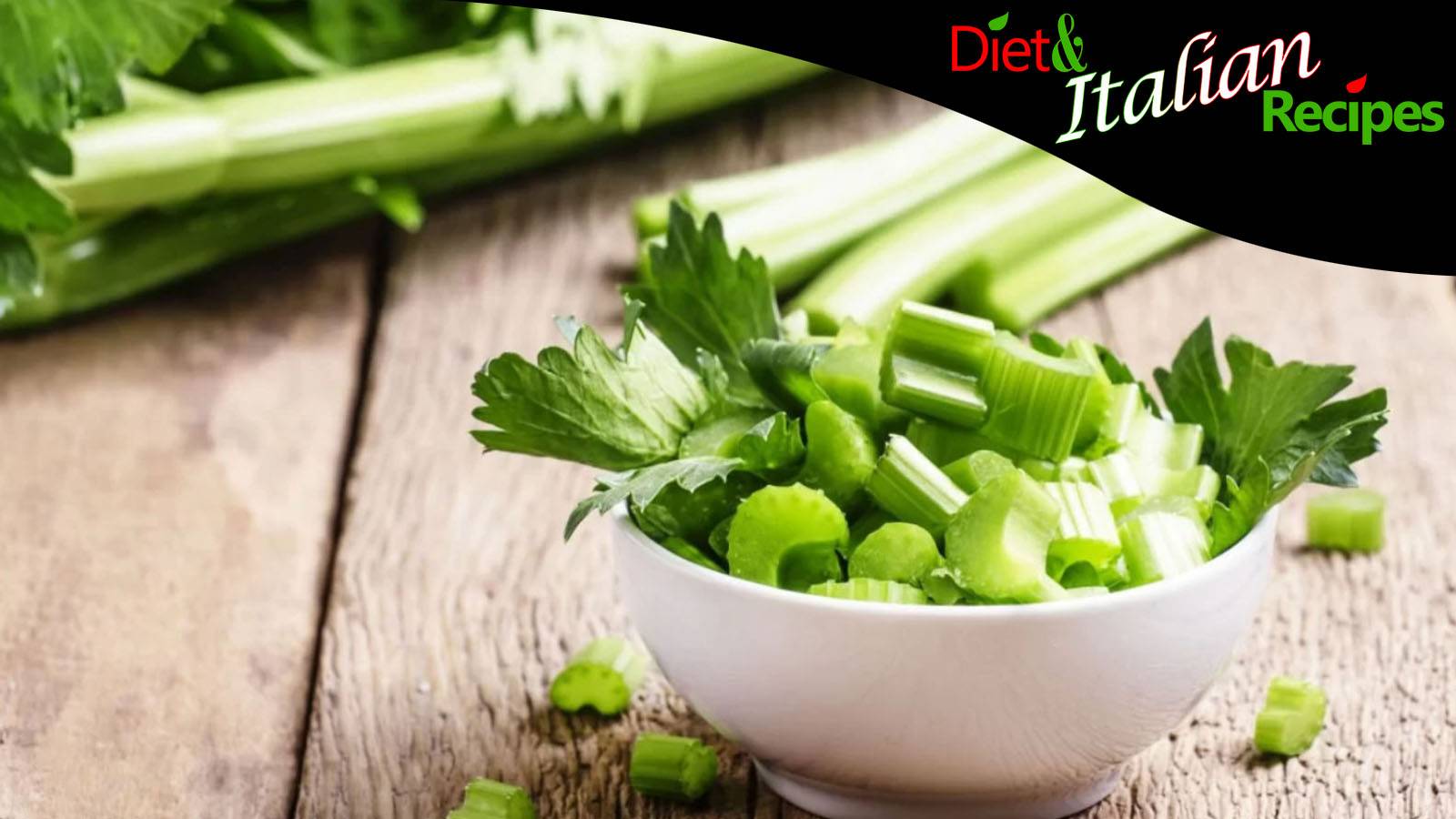Celery is a food that is quickly learned to be loved, starting from its characteristic taste to the properties and numerous health benefits of celery. The properties of celery, primarily therapeutic and healing properties, are useful for staying healthy and fit, and celery is suitable for any diet. In addition to the benefits and properties of celery, we will also examine in detail its nutritional values and the precautions to be aware of. Let’s see then what the healing, therapeutic, digestive, and purifying properties of celery are and what health benefits we can obtain.

Properties of Celery
Eating raw or cooked celery provides numerous benefits to our body, which we all deeply understand but no one can specify in detail. In fact, the properties of celery vary from person to person, and while it can be a panacea for some, for others it may not show any exceptional effects. Let’s take a closer look at all the properties of celery:
- Healing Properties: Reduces inflammation in case of urinary and bladder problems, is useful in case of gastritis, and lowers cholesterol and triglycerides.
- Therapeutic Properties: Fights hypertension and has a protective action for the brain.
- Purifying Properties: Fights water retention, has a diuretic effect, and purifies the body.
- Digestive Properties: Helps digestion by reducing intestinal bloating, and being rich in fiber, it is also useful against constipation.
If we want to tell the whole story, but really the whole story, celery is also considered a food with aphrodisiac properties, a real love elixir that stimulates adrenal and sexual glands. The aphrodisiac properties of celery are due to the presence of delta-16 steroid hormones.
Celery: Therapeutic and Healing Properties
The therapeutic and healing properties of celery are the properties that make celery a food also used in herbal medicine and phytotherapy.
The sedanin contained in celery gives it a detoxifying power that, combined with the content of vitamin A, makes it an excellent anti-inflammatory. The healing properties of celery in this case not only act for bladder problems with a diuretic effect but also against acne and eye infections.
Specific phytonutrients called “ftalds” and contained in celery also allow the control of hormones that regulate blood pressure and make it suitable for the treatment of many cases of hypertension. Celery lowers cholesterol and triglyceride levels thanks to its high fiber content.
Celery: Purifying and Digestive Properties
One of the most well-known properties of celery are its purifying and digestive properties. Celery is rich in fiber, water, vitamins, and minerals, making it the perfect food for any diet. Due to its lightness and ability to counteract bad fats and cellulite, celery is the most appreciated food when going on a diet.
In particular, the fiber content in celery, combined with sedanin, an aromatic stimulating substance, and other molecules such as phenol, mannitol, and inositol, enhance the digestive capabilities of celery. Specifically, digestive action is particularly facilitated by sedanin, which enhances the absorption of intestinal gas in the digestive system.
It’s impossible not to notice the purifying properties of celery, just eating it raw and even in small quantities immediately makes one feel the need to urinate!
Benefits of Celery
The benefits of celery are evident in all aspects, anyone who includes celery in their diet should not have trouble noticing the positive effects of this beneficial food on their body.
Speaking of the benefits of celery, we know that celery is beneficial for the intestines, brain, bones, skin, and eyes, but also towards sexuality, stimulated by delta-16 steroid hormones.
Finally, celery is a low-calorie food suitable for any diet, which gives lightness and eliminates intestinal bloating. A real panacea. It is recommended to eat celery raw or at most steamed or stewed, but above all it should be consumed fresh, within 5 days at the most.
Nutritional Values
Celery is a detox and low-calorie food, with only 20 calories per 100 grams, making it a light vegetable with satiating power. Celery is extremely rich in water, vitamins, and minerals. In detail, here are the nutritional values of celery per 100 grams:
- Water 88.3 g
- Carbohydrates 2.4 g
- Sugars 2.2 g
- Protein 2.3 g
- Fat 0.2 g
- Cholesterol 0 g
- Fiber 1.6 g
- Sodium 140 mg
- Potassium 280 mg
- Iron 0.5 mg
- Calcium 31 mg
- Phosphorus 45 mg
- Vitamin A 207 µg
- Vitamin C 32 mg
- Magnesium 16 mg
- Zinc 1.24 mg
- Copper 0.11 mg
- Vitamin B1 0.06 mg
- Vitamin B2 0.19 mg
- Selenium 3 µg
- Vitamin B3 0.2 mg
Contraindications
There are several varieties of celery, which generally do not cause any discomfort to our body, in fact, they help us in many situations as we have seen. However, celeriac, characterized by powerful roots and narrow ribs and leaves, can cause allergic reactions in sensitive individuals. Those who are predisposed to food allergies should be careful and seek advice from their trusted doctor. In general, celery is usually not recommended during pregnancy because it facilitates the development of food allergies.
SHARE Celery: Therapeutic Properties, Benefits, and Nutritional Values.
The information provided in the Diet and Italian Recipes articles is for INFORMATION ONLY and does not intend to replace the opinion of professional figures such as a doctor, nutritionist, or dietitian, whose intervention is necessary for the prescription and composition of personalized dietary therapies.











